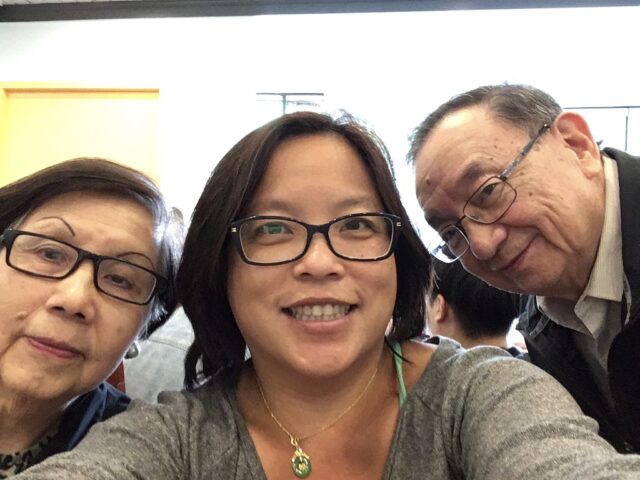Reflective Practice: A Documentation

December 31, 2024 – Climate Change Education – BLOG 1
I went into the photo archives and pulled out this image of me, my mom, and my dad. This photo was taken the day after I successfully defended my dissertation. My mom could not attend my defence. She was not feeling well, but she was always routing for me. In fact, I think she waited for me. She passed away 6-months later. Writing about my mom was not the intention of the blog post, although, I will be writing about my mom soon. I wanted to write about her ever since she had passed away, but I was not ready. I’ve done a lot of work to get to a place of readiness and 2025 is the the year.
My intention in writing this blog post, and there will be many more for 2025, was to write about my thoughts and reflections as a research team member of the Climate Education in Teacher Education (CETE) research project. We have been working on this project for more than 2-years and a few months into our third year. The project started with a focus on Climate Change Education (CCE) with teacher candidates in the first year as one response to the Association for Canadian Deans in Education (ACDE) Accord on Education for a Sustainable Future (2022). Five of us got together.
The initiative started with one person on our term who has an expertise in climate change education and I helped out to share the ask with colleagues within the School of Education to see who was interested. Our research team of 5 formed and amongst the 5 of us, only one of us was a tenure-track member. The rest of us were either term, lecturer, or adjunct. We did not have the agency, ability, or motivation to get the research project off the ground, so this faculty member became the Principal Investigator. The initial goal was to investigate CCE use with Teacher Candidates.
The methodology chosen for this project is Educational Design-Based Research (EDBR) using Sandoval’s Conjecture Mapping. EDBR uses multiple strategies to unpack a complex problem in practical and doable ways. Conjecture mapping tracks our intentions and changes over time. The method, if anything, is experiential with many opportunities to pivot, when needed. We have pivoted many times, and that’s ok. We also work with a Design Team which is comprised of folks who are experts in the field, locally and nationally, and their role is to help guide our work/project.
Our main intervention of the CETE project is CCE workshops for practicing teachers and teacher candidates with a focus on northern BC. We offer/ed 4-workshops per year and in planning these workshops, we tried to anticipate the needs of the field but also listen to the feedback after each workshop. The preparation and development of these workshops are time intensive and much effort is given by research team members, design team members, and research assistant(s). We have offered and facilitated these workshops online and a few of them in person.
The attendance to these workshops have increased over time and so has the research project. As our dreams and aspirations grew, the research project expanded to 4 REB’s… the first is with Teacher Candidates, the second with practicing teachers from 2 school districts, the third is a self-study involving the research team, and the fourth one is the most recent that is focused on Indigenous knowledge holders and elders. This blog post series will focus on REB3, the Self-Study. We are asked as research team members to reflect on our experience and growth within the project.
Finally, I am back to writing about the picture above from my doctoral oral defence. Why does this image matter? My dissertation was about “out-of-field teachers” teaching secondary mathematics. I have an interest in out-of-field teaching, professional learning, and educational leadership. Lots of what I am interested in is MAKING A CHANGE… in one’s practice, in school/class culture, and in educational policy. I love the idea of agency, influence, and engaging learners to “be the change.” We are learners too. Anyway, this is my interest and motivation for the CETE project.
Moreover, I’m blogging about it as a means to reflect on my role on the research team and how this project is impacting me, as a learner, educator, researcher, and educational leader. We have a framework on MS Teams to record our reflections, however, my brain does not work in that way. I found the template to be a barrier to my reflections, so I have decided to blog about my thoughts in my reflective practice and then unpack my reflection within the framework as part of the analysis. Anyway, I am an “out-of-field” researcher on this project and learning lots on CCE and research.